
Carol Harrison is headed to Rome for the upcoming school year thanks to two major fellowships supporting her research on the First Vatican Council (1869-1870).
A professor in USC’s Department of History, Harrison recently won both the Guggenheim Fellowship — one of the world’s most prestigious grants for scholars — and the Rome Prize from the American Academy in Rome, which will allow her to complete her new book project on site.
The fellowships provide substantial financial support for her work and valuable time dedicated to completing it. Harrison says she is still in a state of disbelief that she received them both.
“I found out about the Rome Prize first. It felt like I could not get any luckier,” she says. “Then the Guggenheim Foundation announced their fellows. I don’t think it has quite sunk in yet.”
Joel Samuels, dean of the College of Arts and Sciences, says the awards speak to the merit of Harrison’s scholarship.
“To receive either a Guggenheim Fellowship or the Rome Prize alone would be remarkable, but this double honor is truly extraordinary and reflects the strength and impact of Dr. Harrison’s scholarship,” Samuels says. “She is a model scholar making important simultaneous contributions to the fields of religious studies and world history.”
Harrison’s book in progress, A Women’s History of Vatican I, explores the contributions of women who were deeply invested in the formation of the modern Catholic Church in Europe.
“The women at the center of my book were of different ages and different nationalities. They were French, Polish, German and American, and while the eldest was past 60, the youngest was not yet 30. Their deep commitment to the church brought them together,” Harrison says.
While women of the era did not have formal roles in the church, these women passionately wrote about and debated whether the Pope should be considered infallible, a key decision made in the first meeting of the Vatican council.
“She is a model scholar making important simultaneous contributions to the fields of religious studies and world history.”
— Joel Samuels, dean of the College of Arts and Sciences
“In addition to their published criticism, each of them left behind unpublished, deeply personal writings about the council that reflect spiritual crisis, so that through their eyes we can see Vatican I as both a public and an intimate event,” she says.
By studying near the location of the Vatican, Harrison will follow in the literal footsteps of her subjects, who traveled to or lived in Rome. She will also be present to witness a pivotal step in religious history as this fall the Catholic Church concludes its Synod on Synodality, a three-year series of meetings that has included women in an official capacity for the first time.
“Today, the role of women in the life of the church is one of the central questions of the synod, and for the first time there are women present at the table,” Harrison says. “In Rome, I am looking forward to deepening my understanding of the contexts of Vatican I. I want to meet some of the women who have mobilized in ways that echo their predecessors.”